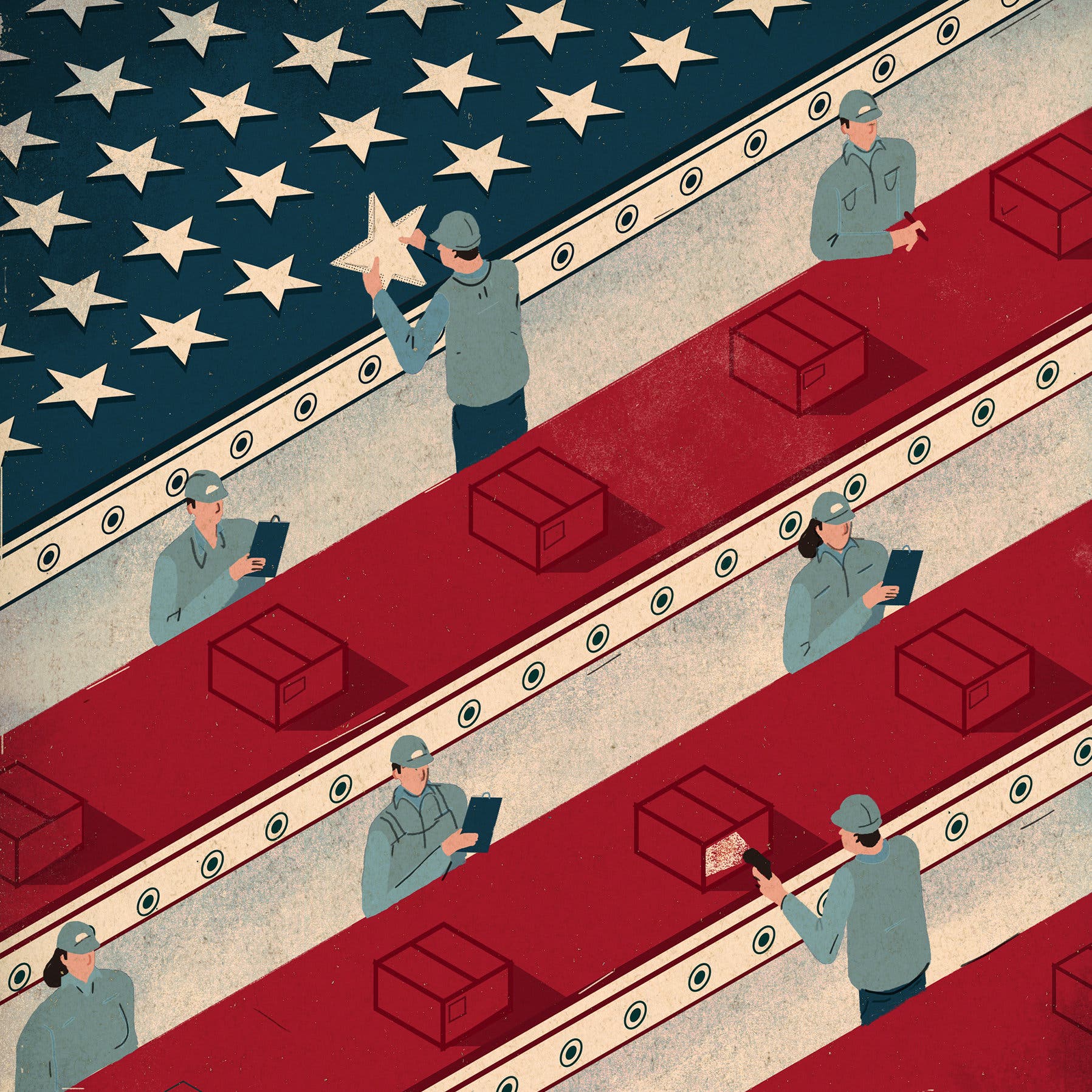Will Trump's Promise Of Restored Factory Jobs In America Become Reality?

Table of Contents
The Promise and its Context
Trump's campaign rhetoric heavily emphasized the need to revitalize American manufacturing and bring back jobs lost to globalization and automation. Slogans like "Make America Great Again" resonated with voters concerned about economic insecurity and the decline of traditional industries. The economic climate at the time was characterized by stagnant wage growth, concerns about trade deficits, and anxieties surrounding the impact of globalization on the American worker. This fertile ground allowed Trump's promise of restored factory jobs to take root.
- Automation's impact: Technological advancements, particularly automation and robotics, have significantly reduced the need for human labor in many manufacturing processes, leading to job losses independent of global trade.
- Globalization and offshoring: The movement of manufacturing to countries with lower labor costs significantly impacted American factory jobs. Trade agreements, while aiming to boost overall economic growth, were often criticized for facilitating this shift.
- Trade agreements: Agreements like NAFTA (now USMCA) were frequently targeted as contributing to the loss of American factory jobs, though the actual impact is a complex and debated topic.
- Public sentiment: A widespread feeling of economic anxiety and a desire for a return to a perceived era of American manufacturing dominance fueled support for Trump's promise.
Policies Implemented to Boost Factory Jobs
The Trump administration implemented several policies aimed at boosting American manufacturing and creating factory jobs. These included:
- Tariffs: High tariffs were imposed on imported goods, aiming to protect American industries and encourage domestic production. While some sectors saw a short-term boost, the resulting trade wars negatively impacted other sectors and led to increased prices for consumers.
- Tax cuts: Significant tax cuts were enacted, aiming to stimulate business investment and job creation. The impact on factory job creation, however, remains a subject of debate among economists.
- Deregulation: Efforts to reduce environmental and other regulations were intended to lower business costs and encourage domestic production. However, concerns about the potential environmental and social consequences of deregulation arose.
The effectiveness of these policies in creating new factory jobs is debatable. While some sectors experienced job growth, others suffered due to retaliatory tariffs and increased input costs. Overall, the net effect on manufacturing employment during the Trump administration remains a complex issue with varying interpretations.
Factors Beyond Presidential Control
Several factors beyond the control of any single president significantly impact the number of factory jobs in America:
- Technological advancements: The relentless pace of technological advancements, including the rise of artificial intelligence and advanced robotics, continues to automate manufacturing processes, reducing the demand for human labor.
- Global economic shifts: Global economic fluctuations, including recessions and shifts in global supply chains, can significantly affect demand for manufactured goods and consequently, employment in the sector.
- Consumer demand: Changes in consumer preferences and spending patterns influence the demand for particular products, impacting production levels and employment in related manufacturing sectors.
- The changing nature of manufacturing: The manufacturing industry itself is evolving, with a growing emphasis on automation, skilled labor, and technologically advanced processes. This shift alters the types of jobs available.
The Role of Reshoring and Nearshoring
Reshoring (bringing manufacturing back from overseas) and nearshoring (moving manufacturing to nearby countries) were promoted as strategies to restore American factory jobs.
- Success stories: Some companies have successfully reshored or nearshored operations, citing improved quality control, reduced transportation costs, and enhanced supply chain resilience as benefits.
- Challenges: The costs associated with reshoring and nearshoring, including investments in new facilities and infrastructure, can be significant hurdles for many companies.
- Government incentives: Government incentives and support programs aimed at encouraging reshoring and nearshoring have been implemented, but their effectiveness varies widely.
The Current State of American Factory Jobs
Analyzing the current state of American factory jobs requires examining data from reliable sources like the Bureau of Labor Statistics. While some sectors have seen growth, others have experienced job losses. A direct comparison with pre-Trump administration figures reveals a mixed picture, with the net gain or loss of factory jobs being a complex issue dependent on specific sectors and methodologies of analysis. Job quality, including wages and benefits, also remains a critical consideration. It is vital to acknowledge that any increase in numbers may not necessarily reflect improvements in overall working conditions.
Conclusion
Determining whether Trump's promise to restore American factory jobs became a reality requires a nuanced understanding of the numerous economic and technological factors at play. While some policies aimed to boost domestic manufacturing, their overall impact on factory job creation is a subject of ongoing debate. The complex interplay of globalization, automation, and policy decisions makes it difficult to attribute specific job gains or losses solely to any single administration's efforts. Understanding the realities of restoring American factory jobs requires ongoing discussion and critical analysis of economic policies. Further research into the evolving manufacturing landscape and the impact of technological advancements is essential for informing future strategies regarding manufacturing jobs and economic growth in the United States.

Featured Posts
-
 On This Love By Suki Waterhouse Lyrics And Their Significance
May 20, 2025
On This Love By Suki Waterhouse Lyrics And Their Significance
May 20, 2025 -
 500 000 Bribery Scheme Lands Retired Navy Admiral 30 Year Prison Sentence
May 20, 2025
500 000 Bribery Scheme Lands Retired Navy Admiral 30 Year Prison Sentence
May 20, 2025 -
 Robert Pattinson And Suki Waterhouse Spotted Hand In Hand In Nyc Amidst The Batman 2 Buzz
May 20, 2025
Robert Pattinson And Suki Waterhouse Spotted Hand In Hand In Nyc Amidst The Batman 2 Buzz
May 20, 2025 -
 Former Us Attorney Zachary Cunha A New Chapter In Private Practice
May 20, 2025
Former Us Attorney Zachary Cunha A New Chapter In Private Practice
May 20, 2025 -
 Valmennusmuutos Huuhkajissa Mm Karsinnat Alkavat
May 20, 2025
Valmennusmuutos Huuhkajissa Mm Karsinnat Alkavat
May 20, 2025
